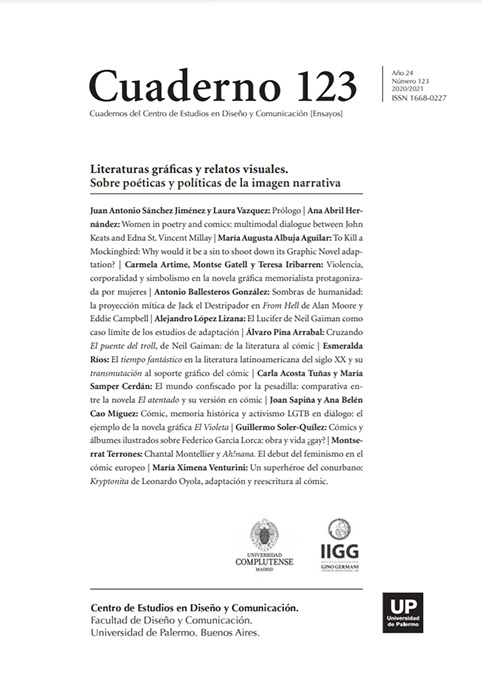Cómics y álbumes ilustrados sobre Federico García Lorca: obra y vida ¿gay?
Abstract
: This paper intends to analyse different biographic illustrated books for children and young readers who show the life of Federico Garcia Lorca: on one hand, picture books by Diaz Plaza and Bayes, Navarro and Vila; López Narváez and Rodríguez,Gibson and Zavala and Sánchez and Casas; on the other hand, graphic novels by: Hernández and El Torres, Javierre and Cabrera, Esquembre, Gibson and Palomo and Martín Segarra. The target of this work consists of analysing how the homosexuality of the poet has been portrayed in order to highlight the didactic possibilities to introduce and familiarize not only the relevant of Federico Garcia Lorca, but also the controversial topic of homosexuality not only in primary lessons, but also in secondary schools. Despite legislative progress related with LGBTQ rights, sexuality is still silenced considered a taboo, for this reason queer pedagogy defends the necessity of introducing in the everyday lessons the reality of LGTBQ people. Learning about Lorca, includying his homosexuality provides the possibility of takle queer culture. This ensures that some stereotypes can be questioned.
References
Aguilar, C. (2017). LIJ y diversidad sexual LGTBI en la formación de maestros. CLIJ: Cuadernos de literatura infantil y juvenil, 30(276), 6-19.
Baile López, E.; Ortiz Hernández, F. J.; Rovira-Collado, J.; Pomares Puig, M. P.; Soler-Quílez, G.; Villaverde Pérez, A.; Albaladejo-Soler, P. V.; Sánchez Verdú, R.; Serna-Rodrigo, R. y
Vidal Martín-Toledano, J. (2015). Aplicaciones didácticas del cómic. Hacia la configuración de un temario universitario. XIII Jornadas de Redes de Investigación en Docencia Universitaria: Nuevas estrategias organizativas y metodológicas en la formación universitaria para responder a la necesidad de adaptación y cambio, Alicante: Universidad de Alicante, pp. 1743-1759.
Bermúdez, S. (2009). Las emociones como centro del impacto narrativo en la interacción con mundos ficcionales. Su necesidad para la teoría literaria. Espéculo: Revista de Estudios Literarios, (41), 71. Recuperado de: http://webs.ucm.es/info/especulo/numero41/emocion.html
Britzman, D. P. (1995). Is there a queer pedagogy? Or, stop reading straight. Educational theory, 45(2), 151-165.
Britzman, D. P. (1997). What is this thing called love? New discourses for understanding gay and lesbian youth. En M. Bryson y S. De Castell (Coord.), Radical in< ter> ventions: Identity, politics, and difference/s on educational praxis, (pp. 183-207). Nueva York: Sunny Press.
Cerrillo, P.; Larrañaga, E. y Yubero, S. (2002). Libros, lectores y mediadores. Cuenca: Ediciones de la universidad de Castilla la Mancha.
Epstein, D. (2000). Reading Gender, Reading Sexualities: Children and the Negotiation of Meaning in “Alternative” Texts. En W. J. Spurlin (Coord.), Lesbian and Gay Studies and the Teaching of English: Positions, Pedagogies, and Cultural Politics (pp. 213-233). Urbana, IL: National Council of Teachers of English.
Gibson, I. (2009). Lorca y el mundo gay. Barcelona: Planeta.
Hermann-Wilmarth, J. (2007) ‘Full Inclusion: Understanding the Role of Gay and Lesbian Texts and Films in Teacher Education Classrooms’, Language Arts 84(4), 347–356.
Ibarra Rius, N. y Ballester Roca, J. (2015). Cómics interculturales, educación literaria y productos políticamente correctos. Revista Tonos Digital, 28, pp. 1-23. Recuperado de: http://hdl.handle.net/10201/42932
Llorens García, R. (2015). Fábulas, educación literaria y didáctica de los valores: Leo Lionni. Tropelías, 23, 61-72.
Meyer, E. J. (2007) “But I’m Not Gay”: What Straight Teachers Need to Know about Queer Theory. En N. Rodriguez y W. F. Pinar (Coord.), Queering straight teachers: Discourse and identity in education. (pp. 15-32). New York: Peter Lang.
Mira, A. (2004). De Sodoma a Chueca. Barcelona-Madrid: Egales.
PalomoPalomo-Alepuz, L. (2019). Propuesta para la aplicación didáctica de Lorca, un poeta en Nueva York de Carles Esquembre. Revista Tebeosfera. Tercera Época, 10, Sevilla.
Pena Tosso, M. (2012). Formación del profesorado en la atención a la diversidad afectivosexual (Tesis doctoral inédita). Universidad Complutense de Madrid, Madrid, España. Recuperado de http://eprints.ucm.es/16718/1/T34011.pdf
Rich, A. (1980). Compulsory heterosexuality and lesbian existence. Signs: Journal of women in culture and society, 5(4), 631-660.
Robinson, K. H. (2002). Making the invisible visible: Gay and lesbian issues in early childhood education. Contemporary Issues in Early Childhood, 3(3), 415-434.
Sedgwick, E. K. (1998). Epistemología del armario. Barcelona: La Tempestad.
Spurlin, W. J. (2000). Lesbian and Gay Studies and the Teaching of English: Positions, Pedagogies, and Cultural Politics. Urbana, IL: National Council of Teachers of English.
Los autores/as que publiquen en esta revista ceden los derechos de autor y de publicación a "Cuadernos del Centro de Estudios de Diseño y Comunicación", Aceptando el registro de su trabajo bajo una licencia de atribución de Creative Commons, que permite a terceros utilizar lo publicado siempre que de el crédito pertinente a los autores y a esta revista.


